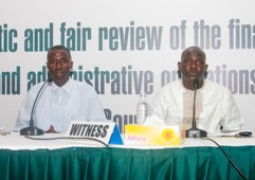Urban planning and development should now be given priority by creating a special Ministry to handle the current issues of unplanned development in the Greater Banjul Area (GBA) – which should stretch from Gunjur to Faraba and from Banjul to Brikama. Other urban centers should be considered – Farafenni, Basse, etc.
This new Ministry should work closely with the climate change agencies of the world in order to seek funding. The planning should give high priority to the provision of drains and a good network of roads. There was once an Urban Management project in the country. It may be revived with a more extensive institutional arrangement.
GBA has all the common problems that highlight the urgent need for planning – a rapidly growing population with a high concentration in a spatially limited area. Urban management is becoming a nightmare – traffic congestion, waste disposal, unemployment and gradual increase in crime rate. The distribution network for public utilities, such as water and electricity, become too daunting and exorbitantly expensive to fix.
The unplanned expansion of land use has been the main threat to the natural waterways that have been used to drain away rain water. Settlements are now found in swampy areas and the natural water drains have been taken over by human habitats – whether in Banjul, Jeswang, Tallinding or Brikama. Urban sprawl has taken over the once agricultural land of GBA. Private unregulated housing estates have sprung up everywhere and land disputes are common and arousing abundant litigations in the law courts.
There had been an earlier study on drains (2013/14) funded by the Kuwaiti Fund that is now gathering dust somewhere. A follow up on that study could trigger support from Kuwait for a possible support to the planning process.
Policy documents are never followed through with the requisite development of strategies of implementation. No wonder important studies have been left to gather dust on the desks and shelves of senior officers. Industrial training should be re-introduced in the civil service. In this regard, the civil service needs to be trained to be more creative and to have more strategic thinkers.
On a long term basis for Banjul, the country should start planning for the location of a new Capital City - that’s the reality. Banjul is one of the cities of the world that is considered to most probably cease to exist by 2050. Relocating capital cities is not a new phenomenon although it could have its emotional downside. There is mostly sentimental value attached to old habitats. Cities have lives and most often than not they do serve their useful lives overtime due to changes in circumstances, such as economic (and the climate). In the short term – the pump house should be revived with enough power to drain the entire city within a short space of time. This will have to be supported by a good drainage network which unfortunately does not currently exist.
The river is dotted with such towns that were once vibrant due to the groundnut trade and used the river to transport the produce to Denton Bridge (Saro) – the Albredas, Kaurs, Kuntaurs, Bwiams and so forth. The movement of goods by river has been overtaken by the development of a road transportation network throughout the country.
The criteria for such a new capital location may be suggested to be one that is away from the coastal area and the neighboring borders. It should preferably be in a low density population area in order to lower the cost of relocating the existing population and it should be easily accessible by road, sea and air. Just Thinking Aloud





